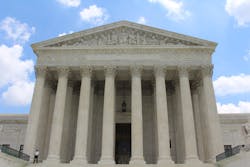Supreme Court clarifies Clean Water Act rules pertaining to groundwater discharge
WASHINGTON, DC, APRIL 27, 2020 -- The Supreme Court ruled Thursday that sewage plants and other industries cannot avoid environmental requirements under landmark clean-water protections when discharging to rivers, oceans and other navigable waterways.
In a 6-3 vote in County of Maui v. Hawai'i Wildlife Fund et al., justices ruled that sewage plants and other industries must obtain a permit under the Clean water act whenever there is the "functional equivalent of a direct discharge" from a point source into navigable waters.
“We hold that the statute requires a permit when there is a direct discharge from a point source into navigable waters or when there is the functional equivalent of a direct discharge,” Justice Stephen Breyer wrote for the court.
Sewage plants and other polluters must get a permit under the Clean Water Act when pollutants go through a pipe from their source to a body of water. The question in this case was whether a permit is needed when the pollutant first passes through the soil or groundwater, AP News reports.
David Henkin, a lawyer for the environmental group Earthjustice who argued the case in the high court, said, “This is unquestionably a win for people who are concerned about protecting clean water in the United States.”
SPECIAL REPORT: Potential Implications of Maui Ruling
